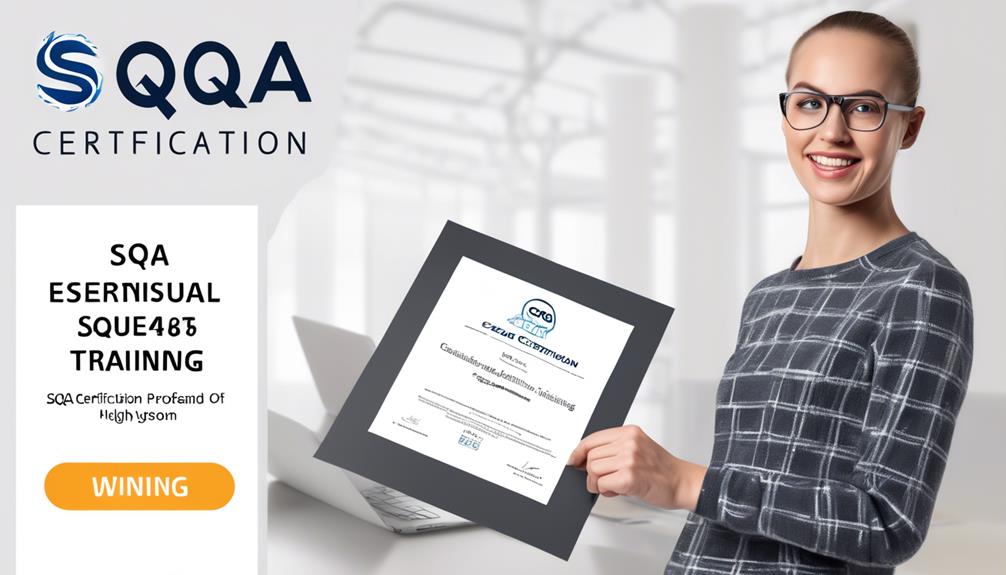The top QA certifications with the highest hiring impact include ISTQB, CSTE, CSQA, PMI-ACP, and TS/ISO 9001. These certifications showcase your testing expertise, industry commitment, and professionalism, making you stand out to employers. They also open doors for advanced roles and better salaries. Gaining these credentials can boost your career growth markedly. Stay with us to discover the full list and gain insights on how to choose the best fit for you.
Key Takeaways
- Recognized certifications like ISTQB significantly enhance employability and influence hiring managers’ decisions.
- Certifications aligned with industry standards demonstrate foundational testing knowledge and specialized skills, boosting career prospects.
- Higher-ranking certifications often correlate with increased salary offers and opportunities for senior testing roles.
- Validated credentials foster professional credibility, expanding networking and mentorship opportunities within the QA community.
- Certifications that focus on current industry trends and advanced methodologies position candidates as valuable, forward-thinking professionals.

Earning the right QA certification can substantially boost your chances of landing a top-quality testing role. When you hold a recognized certification, it signals to employers that you possess a solid understanding of testing methodologies and are committed to your professional growth. Certifications serve as proof of your expertise, making you stand out in a competitive job market. They demonstrate your ability to apply industry best practices, which can directly influence hiring decisions and salary offers. If you’re aiming for career advancement, obtaining the right QA certification can open doors to more senior roles, responsibilities, and higher compensation.
Holding a recognized QA certification boosts your credibility and opens doors to advanced testing roles.
Many employers prioritize candidates with certifications because they reduce onboarding time and increase confidence in your skills. Certifications like ISTQB, for example, are globally recognized and cover fundamental testing methodologies, including test design, planning, and execution. This foundational knowledge is essential for progressing into specialized testing areas such as automation, performance testing, or security testing. As you acquire certifications aligned with your career goals, you’ll develop a broader skill set that aligns with industry demands, making you a more attractive candidate for promotions and leadership roles.
Furthermore, certifications can provide you with a structured learning path, helping you stay current with evolving testing methodologies and technologies. This continuous learning is crucial for career advancement, as the testing field constantly adapts to new tools, frameworks, and best practices. When you invest in certifications, you’re not only validating your existing skills but also demonstrating your dedication to staying at the forefront of the industry. This proactive attitude often leads to recognition from your current employer and can make you a prime candidate when new opportunities arise.
In addition, many organizations view certifications as a mark of professionalism and commitment, which can influence their decision to invest in your development or promote you. Certifications can also expand your professional network, connecting you with other certified testers and industry experts. These connections can lead to mentorship, job referrals, or collaborative opportunities that further accelerate your career progression.
Getting familiar with Self Watering Plant Pots and their benefits can also inspire you to incorporate new skills and technologies into your work, fostering innovation and adaptability. Ultimately, choosing the right QA certifications tailored to your career aspirations can considerably impact your employability and growth. They validate your expertise, enhance your understanding of testing methodologies, and position you as a serious contender for advanced roles. So, if you’re serious about climbing the career ladder in quality assurance, investing in relevant certifications should be a priority. They’re a strategic move that not only boosts your credentials but also accelerates your journey toward greater career achievement.
Top picks for "certification rank impact"
Open Amazon search results for this keyword.
As an affiliate, we earn on qualifying purchases.
Frequently Asked Questions
How Do QA Certifications Influence Salary Negotiations?
When you enter salary negotiations, your QA certifications can remarkably boost your leverage. They demonstrate your expertise and commitment, making you more valuable to employers. Certification leverage often leads to higher starting salaries and better benefits, as employers recognize the added skills you bring. By highlighting your certifications, you show confidence and professionalism, increasing your chances of securing a favorable salary. Certifications truly give you an edge in negotiations.
Are Online QA Certification Courses as Valuable as In-Person Training?
Online QA certification courses can be quite valuable, especially if they’re from reputable providers, as certification validity matters. While in-person training offers hands-on experience, online courses provide flexibility and often cost less. You should consider the course’s credibility and how well it covers industry standards. Ultimately, both formats can boost your skills and employability, but verify the online courses you choose are recognized and respected in the QA field.
What’s the Average Time to Complete Top QA Certifications?
You’re curious about how long it takes to complete top QA certifications. On average, it takes about 3 to 6 months, depending on your prior experience and the certification’s difficulty level. You should consider the certification exam difficulty, which influences preparation time, and perform a certification cost analysis to guarantee the investment matches your career goals. Consistent study and hands-on practice help you finish efficiently and confidently.
Do Certifications Guarantee Job Placement in QA Roles?
Think of certifications as a key, but not the entire lock. While industry recognition from top QA certifications can open doors, they don’t guarantee job placement. Your success depends on meeting certification prerequisites, gaining experience, and demonstrating skills. Certifications boost your credibility, but employers also value practical knowledge and a strong track record. So, use certifications as a stepping stone, but remember, your proactive efforts matter most in landing QA roles.
How Often Should QA Professionals Renew or Update Their Certifications?
You should renew your QA certifications regularly, typically every 2 to 3 years, to stay current with industry standards. Certification renewal often involves completing continuing education and earning recertification credits, which help you uphold your skills and credibility. Staying proactive with ongoing learning ensures you’re up-to-date with the latest testing tools and methodologies, making you more competitive and valuable in the QA job market.
Conclusion
In the competitive world of QA, securing the right certification can substantially boost your hiring chances. By choosing certifications that carry credibility and create opportunities, you craft a clear career path. Focus on foundational, flexible, and forward-thinking credentials to maximize your marketability. Remember, consistent commitment and continuous learning solidify your standing. So, seize the skill, strengthen your stature, and step confidently into your QA career with certifications that truly count.









